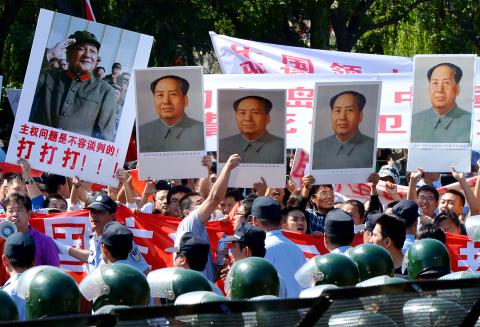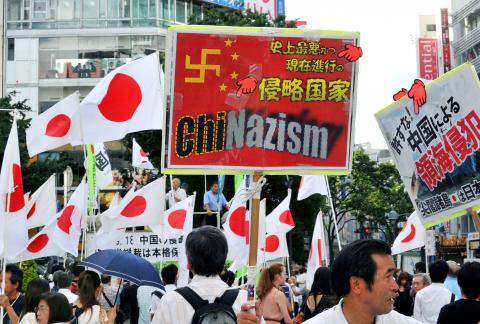Anti-Japan protests reignited yesterday across China, the sensitive anniversary marking Tokyo’s occupation of its giant neighbor, escalating a maritime dispute that has forced major Japanese brandname firms to suspend business there.
Relations between Asia’s two biggest economies have faltered badly, with emotions running high on the streets and also out at sea where two Japanese activists landed on an island at the center of the dispute.
China reacted swiftly to the news of the landing, which risked inflaming a crisis that already ranks as China’s worst outbreak of anti-Japan sentiment in decades. Beijing described the landing as provocative, lodged a complaint with Tokyo and said it reserved the right to “take further action.”

Photo: AFP
The dispute over the uninhabited group of islands in the East China Sea — known as the Senkakus in Japan and Diaoyu Archipelago (釣魚群島) in China — led to another day of protests that were smothered by a heavy blanket of security.
Japanese businesses shut hundreds of stores and factories across China and Japan’s embassy in Beijing again came under siege by protesters hurling water bottles, waving Chinese flags, and chanting anti-Japan slogans.
Japanese Prime Minister Yoshihiko Noda urged Beijing again to protect Japanese citizens in China.

Photo: AFP
“Today is our day of shame,” said a Beijing protester, Wei Libing, a waiter in his 40s. “Japan invaded China on this date.”
“Wipe out all Japanese dogs,” read one banner held aloft by one of thousands of protesters marching on the embassy, which was ringed by riot police standing six rows deep. Japan’s foreign ministry said some embassy windows had been smashed.
For China, yesterday marked the day Japan began its occupation of parts of China in 1931. Rowdy protests sprang up in several cities, including Shanghai, raising the risk they could get out of hand and backfire on Beijing. One Hong Kong paper said some protesters in Shenzhen had been detained for calling for democracy and human rights.
“We still hope for a peaceful and negotiated solution to this issue and we hope to work together and work well with the Japanese government,” Chinese Defense Minister Liang Guanglie (梁光烈) said after meeting US Secretary of Defense Leon Panetta.
Japan’s coast guard said three Chinese marine surveillance ships briefly entered what Japan considers its territorial waters near the disputed islets yesterday evening, the second time since Friday when six ships briefly entered the waters.
Yesterday’s brief landing by two Japanese nationals on one of the disputed islands has raised fears of a direct clash in an area being patrolled by ships from both nations.
“The unlawful landing of the Japanese right-wingers on the Chinese territory of the Diaoyu islands was a gravely provocative action violating Chinese territorial sovereignty,” Chinese Foreign Ministry spokesman Hong Lei (洪磊) said.
The activists briefly landed on one of the islands, having paddled up to it in a rubber raft and swum ashore before returning to the boat, Japanese broadcaster NHK said.

‘ABUSE OF POWER’: Lee Chun-yi allegedly used a Control Yuan vehicle to transport his dog to a pet grooming salon and take his wife to restaurants, media reports said Control Yuan Secretary-General Lee Chun-yi (李俊俋) resigned on Sunday night, admitting that he had misused a government vehicle, as reported by the media. Control Yuan Vice President Lee Hung-chun (李鴻鈞) yesterday apologized to the public over the issue. The watchdog body would follow up on similar accusations made by the Chinese Nationalist Party (KMT) and would investigate the alleged misuse of government vehicles by three other Control Yuan members: Su Li-chiung (蘇麗瓊), Lin Yu-jung (林郁容) and Wang Jung-chang (王榮璋), Lee Hung-chun said. Lee Chun-yi in a statement apologized for using a Control Yuan vehicle to transport his dog to a

Taiwan yesterday denied Chinese allegations that its military was behind a cyberattack on a technology company in Guangzhou, after city authorities issued warrants for 20 suspects. The Guangzhou Municipal Public Security Bureau earlier yesterday issued warrants for 20 people it identified as members of the Information, Communications and Electronic Force Command (ICEFCOM). The bureau alleged they were behind a May 20 cyberattack targeting the backend system of a self-service facility at the company. “ICEFCOM, under Taiwan’s ruling Democratic Progressive Party, directed the illegal attack,” the warrant says. The bureau placed a bounty of 10,000 yuan (US$1,392) on each of the 20 people named in

The High Court yesterday found a New Taipei City woman guilty of charges related to helping Beijing secure surrender agreements from military service members. Lee Huei-hsin (李慧馨) was sentenced to six years and eight months in prison for breaching the National Security Act (國家安全法), making illegal compacts with government employees and bribery, the court said. The verdict is final. Lee, the manager of a temple in the city’s Lujhou District (蘆洲), was accused of arranging for eight service members to make surrender pledges to the Chinese People’s Liberation Army in exchange for money, the court said. The pledges, which required them to provide identification

INDO-PACIFIC REGION: Royal Navy ships exercise the right of freedom of navigation, including in the Taiwan Strait and South China Sea, the UK’s Tony Radakin told a summit Freedom of navigation in the Indo-Pacific region is as important as it is in the English Channel, British Chief of the Defence Staff Admiral Tony Radakin said at a summit in Singapore on Saturday. The remark came as the British Royal Navy’s flagship aircraft carrier, the HMS Prince of Wales, is on an eight-month deployment to the Indo-Pacific region as head of an international carrier strike group. “Upholding the UN Convention on the Law of the Sea, and with it, the principles of the freedom of navigation, in this part of the world matters to us just as it matters in the